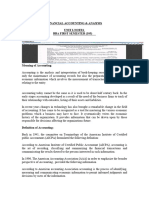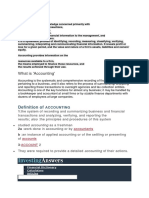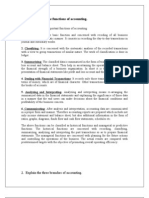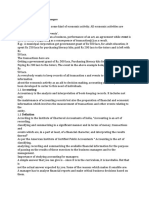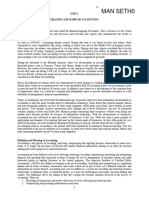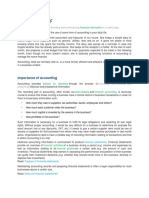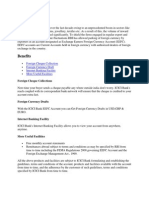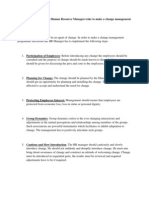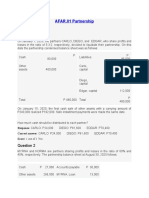0 ratings0% found this document useful (0 votes)
24 viewsSession 3: Dr. M.A. Ganachari
Session 3: Dr. M.A. Ganachari
Uploaded by
Aarti GajulBookkeeping is the process of recording financial transactions such as sales, purchases, income, receipts and payments. A bookkeeper performs this function by ensuring transactions are recorded accurately in daybooks, ledgers, and the general ledger. While bookkeeping and accounting are sometimes confused, bookkeeping is just one part of the overall accounting process. Accountants use the records prepared by bookkeepers to create reports and file forms. Common bookkeeping systems include single-entry and double-entry bookkeeping.
Copyright:
Attribution Non-Commercial (BY-NC)
Available Formats
Download as DOCX, PDF, TXT or read online from Scribd
Session 3: Dr. M.A. Ganachari
Session 3: Dr. M.A. Ganachari
Uploaded by
Aarti Gajul0 ratings0% found this document useful (0 votes)
24 views1 pageBookkeeping is the process of recording financial transactions such as sales, purchases, income, receipts and payments. A bookkeeper performs this function by ensuring transactions are recorded accurately in daybooks, ledgers, and the general ledger. While bookkeeping and accounting are sometimes confused, bookkeeping is just one part of the overall accounting process. Accountants use the records prepared by bookkeepers to create reports and file forms. Common bookkeeping systems include single-entry and double-entry bookkeeping.
Original Description:
FA
Original Title
FA-3
Copyright
© Attribution Non-Commercial (BY-NC)
Available Formats
DOCX, PDF, TXT or read online from Scribd
Share this document
Did you find this document useful?
Is this content inappropriate?
Bookkeeping is the process of recording financial transactions such as sales, purchases, income, receipts and payments. A bookkeeper performs this function by ensuring transactions are recorded accurately in daybooks, ledgers, and the general ledger. While bookkeeping and accounting are sometimes confused, bookkeeping is just one part of the overall accounting process. Accountants use the records prepared by bookkeepers to create reports and file forms. Common bookkeeping systems include single-entry and double-entry bookkeeping.
Copyright:
Attribution Non-Commercial (BY-NC)
Available Formats
Download as DOCX, PDF, TXT or read online from Scribd
Download as docx, pdf, or txt
0 ratings0% found this document useful (0 votes)
24 views1 pageSession 3: Dr. M.A. Ganachari
Session 3: Dr. M.A. Ganachari
Uploaded by
Aarti GajulBookkeeping is the process of recording financial transactions such as sales, purchases, income, receipts and payments. A bookkeeper performs this function by ensuring transactions are recorded accurately in daybooks, ledgers, and the general ledger. While bookkeeping and accounting are sometimes confused, bookkeeping is just one part of the overall accounting process. Accountants use the records prepared by bookkeepers to create reports and file forms. Common bookkeeping systems include single-entry and double-entry bookkeeping.
Copyright:
Attribution Non-Commercial (BY-NC)
Available Formats
Download as DOCX, PDF, TXT or read online from Scribd
Download as docx, pdf, or txt
You are on page 1of 1
MM BGIMS
FINANCIAL ACCOUNTING
MMS SEM I
SESSION 3 Bookkeeping FA(A) 17/08/12
Bookkeeping is the recording of financial transactions. Transactions include sales, purchases, income, receipts and payments by an individual or organization. Bookkeeping is usually performed by a bookkeeper. Many individuals mistakenly consider bookkeeping and accounting to be the same thing. This confusion is understandable because the accounting process includes the bookkeeping function, but is just one part of the accounting process.[1] The accountant creates reports from the recorded financial transactions recorded by the bookkeeper and files forms with government agencies. There are some common methods of bookkeeping such as the single-entry bookkeeping system and the double-entry bookkeeping system. But while these systems may be seen as "real" bookkeeping, any process that involves the recording of financial transactions is a bookkeeping process. A bookkeeper (or book-keeper), also known as an accounting clerk or accounting technician, is a person who records the day-to-day financial transactions of an organization. A bookkeeper is usually responsible for writing the "daybooks". The daybooks consist of purchases, sales, receipts, and payments. The bookkeeper is responsible for ensuring all transactions are recorded in the correct day book, suppliers ledger, customer ledger and general ledger. The bookkeeper brings the books to the trial balance stage. An accountant may prepare the income statement and balance sheet using the trial balance and ledgers prepared by the bookkeeper.
DR. M.A. GANACHARI
You might also like
- NMBC T12 PDocument26 pagesNMBC T12 PALEENA JOSHYNo ratings yet
- Accounting: Step by Step Guide to Accounting Principles & Basic Accounting for Small businessFrom EverandAccounting: Step by Step Guide to Accounting Principles & Basic Accounting for Small businessRating: 4.5 out of 5 stars4.5/5 (11)
- Accounting Survival Guide: An Introduction to Accounting for BeginnersFrom EverandAccounting Survival Guide: An Introduction to Accounting for BeginnersNo ratings yet
- Introduction To AccountingDocument3 pagesIntroduction To Accountingigorproper100% (2)
- Process: Bookkeeping, inDocument2 pagesProcess: Bookkeeping, incleir_No ratings yet
- AccountingDocument32 pagesAccountingraza2658181No ratings yet
- Fa Unit 1Document24 pagesFa Unit 1VTNo ratings yet
- Accounting: What It IsDocument2 pagesAccounting: What It IsKumarNo ratings yet
- National University of Modern Languages: Roll Number: 2153Document4 pagesNational University of Modern Languages: Roll Number: 2153qalander abbasNo ratings yet
- Accounting Business Single-Entry Double-EntryDocument1 pageAccounting Business Single-Entry Double-EntryGreenoTech SolutionsNo ratings yet
- What Is 'Accounting': Definition ofDocument4 pagesWhat Is 'Accounting': Definition ofNica Dacatimbang - LeriosNo ratings yet
- Fundamental of Accounting and Taxation NotesDocument20 pagesFundamental of Accounting and Taxation NotesMohit100% (1)
- Bookkeeping and Cash Management Seminar: Prepared by Agustin D. Pana Sumifru ControllerDocument7 pagesBookkeeping and Cash Management Seminar: Prepared by Agustin D. Pana Sumifru ControllerFebie Jane P. SolonNo ratings yet
- Fundamentals of ABM 1Document58 pagesFundamentals of ABM 1maaltheamorenoNo ratings yet
- Fundamentals of Accountancy, Business, and ManagementDocument22 pagesFundamentals of Accountancy, Business, and ManagementMark Raymond50% (4)
- Single Entry Bookkeeping NotesDocument1 pageSingle Entry Bookkeeping NotesInday MiraNo ratings yet
- Financial AccoountingDocument5 pagesFinancial AccoountingASR07No ratings yet
- Tally Lesson 1Document13 pagesTally Lesson 1kumarbcomca100% (1)
- Difference Between Accounting and BookkeepingDocument3 pagesDifference Between Accounting and Bookkeepingwathiqahzainol100% (3)
- Financial Accounting 123Document46 pagesFinancial Accounting 123shekhar87100% (1)
- Give Atleast 3 Meaning of Accounting?Document3 pagesGive Atleast 3 Meaning of Accounting?Hazzelle DumaleNo ratings yet
- Financial Accounting - I BcaDocument24 pagesFinancial Accounting - I Bcaselvam sNo ratings yet
- Accounting Bookkeeping and AuditingDocument5 pagesAccounting Bookkeeping and Auditingyasmine bensaadNo ratings yet
- Accounting NotesDocument66 pagesAccounting NotesSreenivas KuppachiNo ratings yet
- Definition and Inportance of AccountingDocument1 pageDefinition and Inportance of Accountinggvw4wvNo ratings yet
- An Introduction AccountingDocument16 pagesAn Introduction AccountingArathy KrishnaNo ratings yet
- Business AccountingDocument16 pagesBusiness AccountingMark 42No ratings yet
- 1 - Accounting - An Introduction (167 KB)Document16 pages1 - Accounting - An Introduction (167 KB)Rajah ParanthamanNo ratings yet
- English 4 Accounting - Unit 3 Bookkeeping ReadingDocument2 pagesEnglish 4 Accounting - Unit 3 Bookkeeping ReadingValkiria ChacrasNo ratings yet
- Financial Accounting and AnalysisDocument19 pagesFinancial Accounting and AnalysisShivam ChandraNo ratings yet
- Principle of AccountingDocument4 pagesPrinciple of AccountingMahabub Alam100% (1)
- What Is Bookkeeping, PDFDocument2 pagesWhat Is Bookkeeping, PDFreghu.chanduNo ratings yet
- Define Accounting? Explain The Branches of AccountingDocument3 pagesDefine Accounting? Explain The Branches of AccountingMahadi Hasan RabbyNo ratings yet
- Module For AccountingDocument46 pagesModule For AccountingJhefz KhurtzNo ratings yet
- Basic AccountsDocument51 pagesBasic AccountsNilesh Indikar100% (1)
- ACCT. 1 Learning Material 1Document9 pagesACCT. 1 Learning Material 1Bcf ChurchNo ratings yet
- Chapter 1 Introduction To AccountingDocument4 pagesChapter 1 Introduction To AccountingMickyla Joyce PreNo ratings yet
- Ahenkye Pasco Accounting 1 and 2 Notes and Solved Past QuestionsDocument208 pagesAhenkye Pasco Accounting 1 and 2 Notes and Solved Past QuestionspeterokotettehNo ratings yet
- Module #1 in BookkeepingDocument3 pagesModule #1 in Bookkeepingrowena marambaNo ratings yet
- What Is The First Thing That Comes To Your Mind When You Hear The Term AccountingDocument16 pagesWhat Is The First Thing That Comes To Your Mind When You Hear The Term AccountingshonkittyNo ratings yet
- Principles of Basic BookkeepingDocument8 pagesPrinciples of Basic Bookkeepingtunde adeniranNo ratings yet
- Group 6 IbdivDocument6 pagesGroup 6 IbdivRafasya Dan ShakilaNo ratings yet
- BookkeepingDocument2 pagesBookkeepinglewepyNo ratings yet
- Assignment 03Document9 pagesAssignment 03duhkhabilasa4No ratings yet
- Unit-1 Introduction to AccountingDocument24 pagesUnit-1 Introduction to AccountingrishabhvatsrrvvNo ratings yet
- Unit 3 - Bookkeping-1-2Document2 pagesUnit 3 - Bookkeping-1-2JHON ALEJANDRO GALLEGO GALINDONo ratings yet
- Frauds in Financial StatementsDocument73 pagesFrauds in Financial Statements✬ SHANZA MALIK ✬No ratings yet
- Chap 1 Accounting Nature Scope Concept and ConventionDocument5 pagesChap 1 Accounting Nature Scope Concept and Conventionyousaf.mast777No ratings yet
- Chapter 1Document10 pagesChapter 1rahul bhutraNo ratings yet
- ACCOUNTING - Definition, Phases, Importance With SpeechDocument6 pagesACCOUNTING - Definition, Phases, Importance With SpeechCaryl Anne MagalongNo ratings yet
- Bookkeeping and AccountingDocument2 pagesBookkeeping and AccountingGiico BorjaNo ratings yet
- Accountig Chapter 1Document8 pagesAccountig Chapter 1Berhan TadesseNo ratings yet
- Lesson-1Document19 pagesLesson-1afandreaferrer2006No ratings yet
- What Is AccountingDocument4 pagesWhat Is AccountingRechie Gimang AlferezNo ratings yet
- Types of AccountingDocument18 pagesTypes of AccountingSyed NaqviNo ratings yet
- UNIT-1 AccountsDocument34 pagesUNIT-1 AccountsPiyush KumarNo ratings yet
- Eco 02Document46 pagesEco 02Tanishq MaherNo ratings yet
- Introduction To Financial Accounting - TheroyDocument13 pagesIntroduction To Financial Accounting - TheroyNeelanjan MitraNo ratings yet
- From Ledgers to Success: A Practical Approach to Modern BookkeepingFrom EverandFrom Ledgers to Success: A Practical Approach to Modern BookkeepingNo ratings yet
- QuestionnaireDocument6 pagesQuestionnaireAarti GajulNo ratings yet
- TreasuryDocument23 pagesTreasuryAarti GajulNo ratings yet
- EEFC AccountDocument4 pagesEEFC AccountAarti GajulNo ratings yet
- Indusind BankDocument19 pagesIndusind BankAarti GajulNo ratings yet
- EEFC AccountDocument4 pagesEEFC AccountAarti GajulNo ratings yet
- Non Fund Based ServicesDocument1 pageNon Fund Based ServicesAarti GajulNo ratings yet
- Indusind Bank:-Fund Based Services (FB) Working Capital FinanceDocument2 pagesIndusind Bank:-Fund Based Services (FB) Working Capital FinanceAarti GajulNo ratings yet
- International BusinessDocument18 pagesInternational BusinessAarti GajulNo ratings yet
- Cost & Management Accounting: A Report On Following TermsDocument17 pagesCost & Management Accounting: A Report On Following TermsAarti GajulNo ratings yet
- Group Conflicts & Group Decision Making: Thank YouDocument1 pageGroup Conflicts & Group Decision Making: Thank YouAarti GajulNo ratings yet
- Submit Ted T O: Prof - Gaurav RathodDocument16 pagesSubmit Ted T O: Prof - Gaurav RathodAarti GajulNo ratings yet
- Cost and Management Accounting: Presented To:-Prof. M.A.GanachariDocument10 pagesCost and Management Accounting: Presented To:-Prof. M.A.GanachariAarti GajulNo ratings yet
- Dairy IndustryDocument17 pagesDairy IndustryAarti GajulNo ratings yet
- Data ProcessingDocument4 pagesData ProcessingAarti Gajul0% (1)
- HRM Notes Bms - Co.inDocument5 pagesHRM Notes Bms - Co.inAarti GajulNo ratings yet
- Afar - Partnership, Corporate Liquadation & Home Office and BranchDocument31 pagesAfar - Partnership, Corporate Liquadation & Home Office and BranchMitch MinglanaNo ratings yet
- 82989Document3 pages82989Abhishek JaiswalNo ratings yet
- Hotel Rservation PrelimDocument9 pagesHotel Rservation PrelimMajestyNo ratings yet
- Financial Management PDFDocument18 pagesFinancial Management PDFyoussefNo ratings yet
- Visa Checklist All Categories and Countries Bangkok Hub 020222Document2 pagesVisa Checklist All Categories and Countries Bangkok Hub 020222Cecilia NuevaNo ratings yet
- Deputy CISO - Biogen PDFDocument5 pagesDeputy CISO - Biogen PDFNamasivayam SarojaNo ratings yet
- Quality Implementation Working Group On Q8, Q9 and Q10 Questions & Answers (R4)Document17 pagesQuality Implementation Working Group On Q8, Q9 and Q10 Questions & Answers (R4)Ajay SinghNo ratings yet
- Sam Kennedy DissertationDocument8 pagesSam Kennedy DissertationWhereCanIFindSomeoneToWriteMyCollegePaperCharlesto100% (1)
- By Dale A Gulden, Solar Direct CEODocument22 pagesBy Dale A Gulden, Solar Direct CEOAbdulkhadir Suhair100% (1)
- The Sheraton Park Lane Hotel Online Interview Form PDFDocument2 pagesThe Sheraton Park Lane Hotel Online Interview Form PDFYessy TrottaNo ratings yet
- Iso 2553-2019Document62 pagesIso 2553-2019Yangng0113100% (2)
- Research Project Report (Online Taxi Service)Document35 pagesResearch Project Report (Online Taxi Service)Akber UmerNo ratings yet
- PDFDocument33 pagesPDFPradeep KumarNo ratings yet
- Assignment (1) - 231024 - 191258Document4 pagesAssignment (1) - 231024 - 191258aderramo66No ratings yet
- ESSAY 10 MARKS (Eco120)Document5 pagesESSAY 10 MARKS (Eco120)husna azizanNo ratings yet
- Night Hunter Pro - Setup GuideDocument111 pagesNight Hunter Pro - Setup GuideXcosNo ratings yet
- Managerial Economics and AccountancyDocument2 pagesManagerial Economics and AccountancyVkNo ratings yet
- 317 BowicijiwinuqDocument3 pages317 BowicijiwinuqHsjsjNo ratings yet
- EFAS-Jack-n-Jill-Company (FINAL)Document2 pagesEFAS-Jack-n-Jill-Company (FINAL)ARLENE GARCIANo ratings yet
- Damai Grop ResortDocument3 pagesDamai Grop ResortIzzul HafizNo ratings yet
- One Page Contract - For WholesalingDocument1 pageOne Page Contract - For WholesalingAdeyemi El-AminNo ratings yet
- Bill Overview: Jlb9Gjq5Psbgxfivcivc Ykpfi4Cvukywirxmrjzunpccvgacc7FDocument6 pagesBill Overview: Jlb9Gjq5Psbgxfivcivc Ykpfi4Cvukywirxmrjzunpccvgacc7FPendaftaran PerwiraNo ratings yet
- Download ebooks file Hacking Digital: Best Practices to Implement and Accelerate Your Business Transformation Michael Wade all chaptersDocument47 pagesDownload ebooks file Hacking Digital: Best Practices to Implement and Accelerate Your Business Transformation Michael Wade all chaptersgleezyzeed100% (2)
- Brian A. Eales (Auth.) - Financial Engineering-Macmillan Education UK (2000)Document301 pagesBrian A. Eales (Auth.) - Financial Engineering-Macmillan Education UK (2000)fiama.duarteNo ratings yet
- MisDocument4 pagesMisjust giggledNo ratings yet
- Ey Apply Ifrs Accounting For Climate Change August 2023 - v2Document68 pagesEy Apply Ifrs Accounting For Climate Change August 2023 - v2Abder AouadNo ratings yet
- SiddarameshDocument3 pagesSiddarameshElango SundaramNo ratings yet
- The Marketing Mix and The 4Ps of Marketing - FromDocument7 pagesThe Marketing Mix and The 4Ps of Marketing - FromAston SamalesuNo ratings yet
- Marketing Exam 10 DecDocument152 pagesMarketing Exam 10 DecTauseef AhmedNo ratings yet






